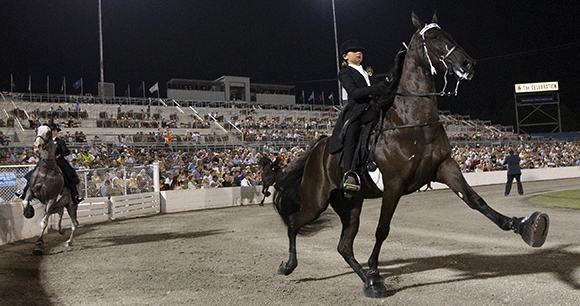
Washington, DC—Today, the US Department of Agriculture published a final rule to end the brutal practice of horse soring at Tennessee walking horse shows.
The improved regulations, scheduled to take effect on February 1, 2025, entail the most comprehensive upgrade to the Horse Protection Act (HPA) since it was passed in 1970. They eliminate the corrupt and ineffectual horse show self-policing system by horse industry organizations, prohibit pain-inflicting devices associated with soring, and enhance the ability of inspectors to detect evidence of abuse.
Soring involves the deliberate infliction of pain on a horse’s hooves and legs—such as applying caustic chemicals deep into the flesh, attaching chains to strike against sore legs, and inserting screws into tender areas of the hooves—to create an exaggerated high-stepping gait known as the “Big Lick” during competitions and shows.
“Although the Horse Protection Act was signed into law 54 years ago to shield Tennessee walking horses and other gaited breeds from precisely this type of abuse, it continues unabated,” said Joanna Grossman, Ph.D., equine program director and senior policy advisor for the Animal Welfare Institute (AWI). “These regulations mark a new era for enforcement of the law and will better protect these gentle companions from pernicious and gruesome practices associated with soring.”
Efforts over the years by AWI and other animal welfare groups to call attention to significant gaps in HPA enforcement and advance meaningful reforms have drawn stiff opposition from industry interests and the lawmakers beholden to them. After a USDA rule to crack down on soring was nearly finalized in 2017 during Secretary Vilsack’s prior tenure at the department, it was subsequently withdrawn by the Trump administration.
Legislative remedies have also been stymied. First introduced in 2007, the Prevent All Soring Tactics (PAST) Act has consistently received strong bipartisan support while collecting endorsements from the American Veterinary Medical Association, the American Association of Equine Practitioners, the American Horse Council and even—despite industry opposition elsewhere—several show horse industry groups. The bill overwhelmingly passed the House of Representatives twice, only to languish in the Senate.
In 2021, the National Academies of Sciences, Engineering and Medicine (NASEM) released a report urging the USDA to discontinue its reliance on industry inspectors, and instead depend on veterinarians to inspect horses for soreness.
The new USDA rule incorporates many of the PAST Act’s reforms and NASEM’s science-based recommendations, including eliminating industry self-regulation at horse shows, exhibitions, sales, and auctions, and leaving compliance monitoring to APHIS inspectors and APHIS-trained independent inspectors.
Marjorie Fishman, Animal Welfare Institute
(202) 446-2128, [email protected]
The Animal Welfare Institute is a nonprofit charitable organization founded in 1951 and dedicated to reducing animal suffering caused by people. AWI engages policymakers, scientists, industry, and the public to achieve better treatment of animals everywhere: in agriculture, in commerce, in our communities, in research, and in the wild. Follow us on Facebook, X (formerly Twitter), and Instagram for updates and other important animal protection news.